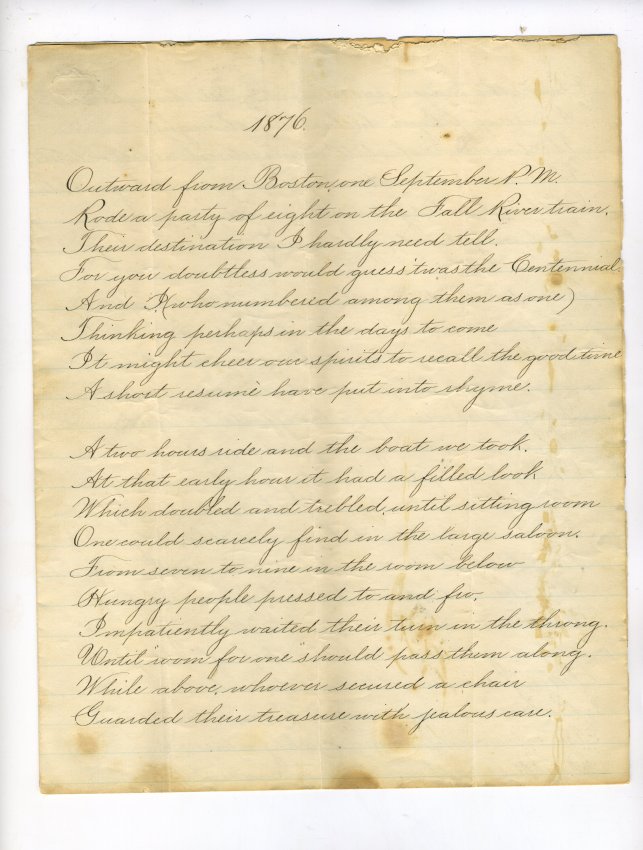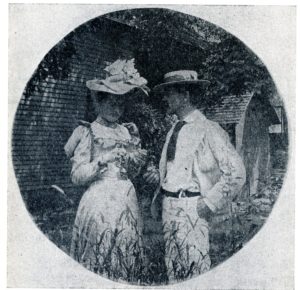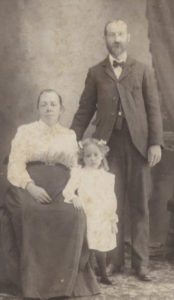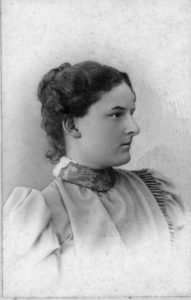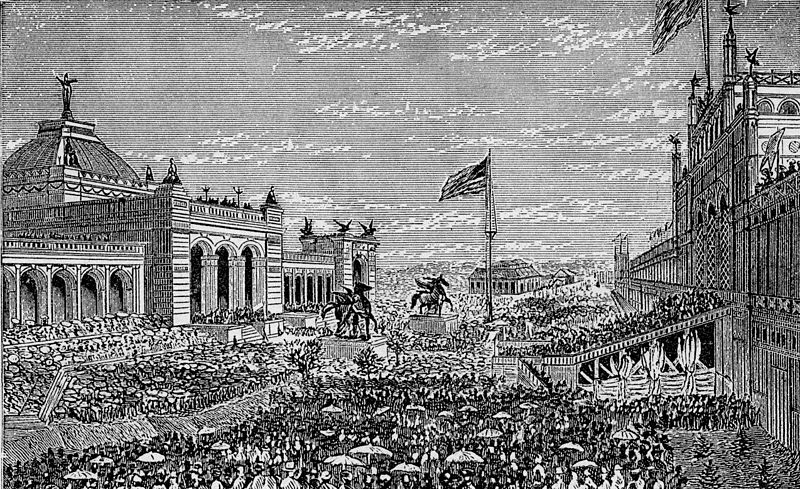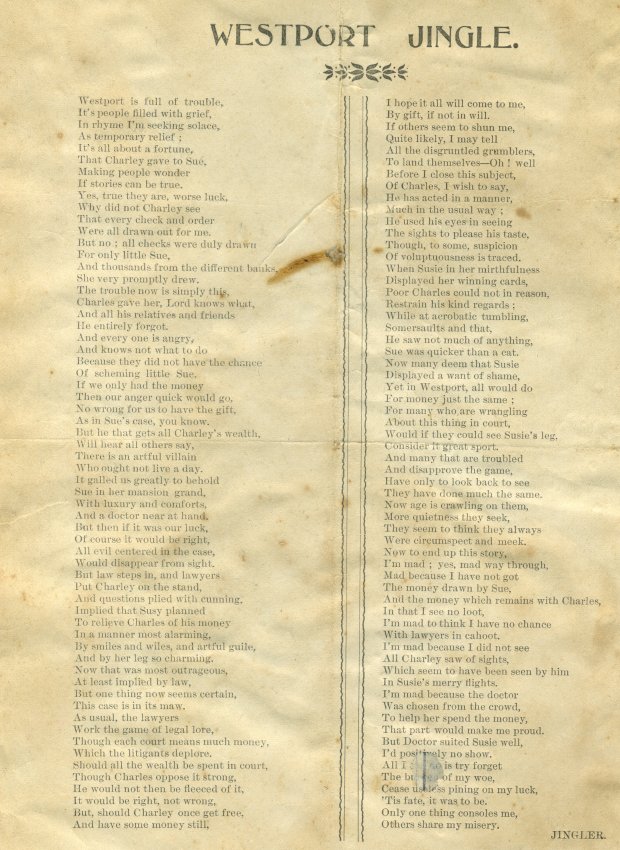Westport’s Poetic History: In Celebration of National Poetry Month
Posted on April 20, 2021 by Jenny ONeill
Local history research can lead to some unexpected discoveries. What began as an effort to highlight some poetry found in the Westport Historical Society’s collection, has led to a deeper exploration into the history of Westport’s cultural past.
Westport’s seclusion and natural beauty has served to attract, inspire and rejuvenate artists and writers for many years. Today it continues to provide a sanctuary for poets, both published and unpublished. This article will brush the surface of the creative summer community of artists, writers and educators (many associated with Chicago’s Arts and Crafts movement at Hull House) that evolved around Westport Point. It will also highlight well known visiting poets such as Elizabeth Bishop.
And finally, we will feature some lesser known homegrown poets. Long before social media became our primary forum for expression, many individuals turned to verse as a way to voice opinions. The Westport Historical Society’s collection includes many amateur poetic creations that cover a surprisingly wide variety of themes such as politics, taxes, real estate, rum running, secession, and even the joys of the outhouse.
Whether nostalgic, commemorative, romantic, opinionated, humorous, or accusatory, these poems will take you on a literary journey through Westport’s poetic past.
We welcome your suggestions and input. Please let us know of additional poets who should be represented in our collection. Our focus is on poetry with a Westport theme or poets with a strong Westport connection. We will preserve poetic publications and biographical information as part of our collection
Visiting Poets
Elizabeth Bishop (1911 – 1979)
Analyzing her small but significant body of work for Bold Type, a critic wrote: “Bishop’s poetics is one distinguished by tranquil observation, craft-like accuracy, care for the small things of the world, a miniaturist’s discretion and attention. Unlike the pert and wooly poetry that came to dominate American literature by the second half of her life, her poems are balanced like Alexander Calder mobiles turning so subtly as to seem almost still at first, every element, every weight of meaning and song, poised flawlessly against the next.”
Bishop wrote parts of “One Art,” perhaps her finest poem here in Westport at the home of her friend Rhoda Wheeler Sheehan. Rhoda was a lifelong resident of Westport Harbor, Massachusetts. She first met Elizabeth Bishop at Walnut Hill School, Natick MA, beginning a friendship that continued during their time as students at Vassar College.
A recent article by her granddaughter Fiona Sheehan features the correspondence between the two friends. (Sheehan, Fiona A. ‘Affectionately Yours, Bishop’: The Early Correspondence of Elizabeth Bishop and Rhoda Wheeler Sheehan. Resources for American Literary Study, Penn State University Press. 2018; 40: 229-280. https://fionasheehan.wordpress.com/portfolio/elizabeth-bishop-correspondence-research-project/)
From this article by Fiona Sheehan we learn more about Bishop’s experiences in Westport which included rowing around the ‘horse’s neck’::
After all my boasting about my letter writing I didn’t do so well after all. . . . There isn’t any [smear] excuse, either, except that I dropped out of Westport harbor into the Doldrums. . . I am emerging on the other side now. I saw a seagull, and a drifting stick carved by human hands – and last night I think I saw a light in the offing.
July 1930
Written to Rhoda Wheeler Sheehan
If you really want to know how much I thank you for the wonderful time I had, please ask Barbara. I confided in her how I liked things and maybe she can tell you in person better than I could in writing. But then, you’ve seen what it was an escape from, so you ought to be able to realize my emotions! I had the best row around the horse’s neck, or whatever you call it, and I feel a much more respectable color. I felt indecently pale before – all today my back has been very stiff and burning. . . . Thank you very much.
One Art
Elizabeth Bishop
I lost my mother’s watch. And look! my last, or
next-to- last, of three loved houses went.
The art of losing isn’t hard to master.
I lost two cities, lovely ones. And, vaster,
some realms I owned, two rivers, a continent.
I miss them, but it wasn’t a disaster.
—Even losing you (the joking voice, a gesture
I love) I shan’t have lied. It’s evident
the art of losing’s not too hard to master
though it may look like (Write it!) like disaster.
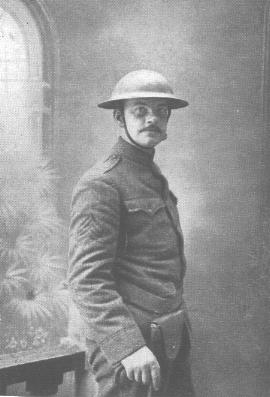 (Alfred) Joyce Kilmer (1886 -1918) an American writer and poet who reputedly stayed in a house located at 787 Pine Hill Road. He is remembered for a short poem titled “Trees” (1913). There is however no evidence to suggest that this poem has a Westport connection.
(Alfred) Joyce Kilmer (1886 -1918) an American writer and poet who reputedly stayed in a house located at 787 Pine Hill Road. He is remembered for a short poem titled “Trees” (1913). There is however no evidence to suggest that this poem has a Westport connection.
Trees
I think that I shall never see
A poem lovely as a tree.
A tree whose hungry mouth is prest
Against the earth’s sweet flowing breast;
A tree that looks at God all day,
And lifts her leafy arms to pray;
A tree that may in Summer wear
A nest of robins in her hair;
Upon whose bosom snow has lain;
Who intimately lives with rain.
Poems are made by fools like me,
But only God can make a tree.
While most of his works are largely unknown today, a select few of his poems remain popular and are published frequently in anthologies. Critics have dismissed Kilmer’s work as being too simple and overly sentimental. He enlisted in the U.S. Army to serve in World War I. He died of a gunshot from a German sniper on July 30, 1918.
Poets of Westport Point
Westport Point became the summer retreat for a number of Chicago-based educators and artist who were active in the late 19th century Arts and Crafts movement (centered at Hull House). Westport’s environment was a source of inspiration and rejuvenation for these families.
Vibe and Anne Spicer followed their friends, the Yeomans, to Westport Point. Anne was a creative writer, adopting the pen name of Anchusa (a flowering plant). She published her poetry in two volumes and she was a contributor to a popular column in the Chicago Tribune called, “A Line ‘O Type or Two.”
They settled in a little house on Cape Bial Lane “that looked out upon a thick matted slope of wild roses, bayberry, sweet fern….down to the marshes bordering the river” (Edward Yeomans). Their summers were spent at Westport Point among a group of like-minded educators and artists, enjoying music, painting, writing, sailing, gardening, and folk dancing.
Carpe Diem
(Anne Spicer, Artists in Living, 1941)
If this were my last day I’m almost sure
I’d spend it working in my garden. I
Would dig about my little plants, and try
To make them happy, so they would endure
Long after me. Then I would hide secure
Where my green arbor shades me from the sky,
And watch how bird and bee and butterfly
Come hovering to every flowery lure.
Then as I rested, perhaps a friend or two,
Lovers of flowers would come, and we would walk
About my little garden paths, and talk
Of peaceful times when all the world seemed true.
This may be my last day, for all I know;
What a temptation just to spend it so!
Chicago based Edward Yeomans (1865-1942) sailed into the sheltered port of Westport Point in 1893 and fell under the spell of its charm, beauty and history. He created a summer home on Main Road, encouraging many of his Hull House friends to join him at Westport Point. Edward Yeomans dedicated his working life to educational reform, founding the Ojai Valley School, CA. A few of his poems celebrating the summer experience at Westport Point have been published.
July Down East
(Occasional Notes, 1923-1933)
All day the southwest wind has whipped the high ripe grass,
And swirled the bushy islands in the field,
(Salt wind and warm and wet,
Breath of the misty sea–the same
That blew the Northmen and the caravels).
All day the swallows swooped and soared,
Flung up by gusts on slanting purple wings,
And robins balanced clownishly on tips of junipers.
Trying if they could stick there, as a stunt,
And with no mind to sing–
For singing comes of leisure — with the robins.
But in the thick and fragrant mat of cedar and sweet fern,
Bayberry, fox–grape and sharp–sweet wild azalea,
Behind the old stone wall,
There was no wind!
The July sun soaked there and spread around
An aromatic incense.
(Is there a windless place like that in every life,
Exhaling subtle memories–faint and fragrant-
No matter how it blows?)
The thrasher shows a flash of rusty tail;
The catbird mews at intervals,
And one towhee “Che–winks–che–winks.”
By sundown all the wind has gone,
Each grass spear stands erect, alert and waiting.
The last of day slips westward.
Then come the fireflies!
Against the wall of foliage that bounds the field,
Faint winks of light,
Among the black-robed junipers nearby
A glimmer, here and there,
A gliding floating spark of green along the field–
Then more and more–andante–and allegro,
With now and then a scherzo,
An upward– spiral and ecstatic streak.
Fireflies! Amazing magic of the wizard earth!
Nature had time for everything–so this!
How can we go to bed on such a night?
What’s life for anyway, if not to make us all
A part of this–and not outsiders?
Why be outside of anything that’s good?
(Even of beds at proper times),
People or things–sea, earth or air,
Music, books, or art or science,
Philosophy and religion,
Fields, factories and workshops.
Schools and colleges,
Ships and locomotives,
Horses, cows and oxen,
Birds and insects.
But now, just now, these fireflies!
Forget all else–this is enough and more.
So the night glittered–
Hours of silence and these drifting lights
Except one voice—the tree frog–somewhere, anywhere,
Trilling her contralto. What a voice!
What calm in that for feverish folk.
Just that trill–all that’s left for ears;
And for the eyes, the fireflies.
How’s that for ending a windy day?
All right–we’ve got that stowed away for good,
We never can be quite the same again–nor it.
And so to sleep, and dream a little, too.
In darkened craniums
Again the earth and sky–the breathless night,
And specks of light that float and fade.
Faces and voices drift up–flash their whole quality- drift on.
What it all means, God knows, not you.
Nor even Freud and Jung.
What is the meaning, please, of anything?
The dawn steals down along the ancient lane,
“A frightened girl”–a la one Oscar Wilde–
(Look up that fearful thing “The Harlot’s House”)
The sun slants through the grass,
Another kind of sparkle’s there.
Pale sheets are spread by spiders, full of dew;
The chipping sparrow’s on the roof again,
Having a nest nearby, and sings his “opus one”
The chickadee pops from his little box
Under the eaves there, where his family lives,
And if you whistle “p–e–e–e–wee wee!”
He’s just the boy to answer,
Doing it right–to show you how it’s done;
The catbird makes a concert by himself;
He’s got it in him–and assurance too–
When he once quits his whining.
And the robins–oh, everywhere the robin rules the dawn,
Down east here.
Though they can’t drown these soloists, bob-white and meadow lark,
Or–safe arrived again from Argentine–the bobolink.
Down in the hollow thickets, aloof, remote, a wood thrush!
The very lure and light of Vagabondia.
Now then–what for? What’s all this worth?
What will you trade it for, Los Angeles, New York?
The American Legion?
Ocean steamships packed for Europe?
Boards of trade and stock exchanges?
Princeton, Yale and Harvard?
And hardly is it yours to choose
The choice was made long, long ago,
And you are what you had to be.
You are inside of this or outside, that is all;
Or it’s in you — whichever way you say.
An old New England field,
The sea in sight, and in its purple robes;
The little creatures of the night and day,
And you — alive yet — alive and looking round,
Alive and soaking in the light
Of sun and moon and stars;
Hearing and smelling;
And, as your power is — perceiving more or less
Let us hear the conclusion of the whole matter.”
As Solomon says.
But instead of his conclusion —
I’ll put this — this also of that Ancient East,
Mother of all religions–
“In one salutation to Thee, my God, let all my senses
spread out and touch this world at Thy feet.”
The Political Poet
Herbert Sanford of Greenwood Park, North Westport was a prolific poet. His poems are a reflection of Westport in the 1920’s, focusing on local politics, taxes, rum running and other current events.
Citizens of dear old Westport
What will you have to say?
When it comes to our election
Is it going the same old way?
At places the woods are infested
With stills and moonshine galore
And if the constables were not on the job
Who knows there would be any more?
Are the schools do you think progressive?
Do you realize what they cost now to run?
Do you know where all the coal goes?
And how much it cost now per ton?
He wrote a very candid poem about the rumrunners coming into Westport Point, naming names:
It was half past 3 in the morning
Not many days ago
Russell was seen at Westport Point
Hitt was down below
Soon a team was on the scene
With seaweed homeward bound
And when it reached the Cornell road
What do you suppose was found?
A lot of booze was in that muck
And however could it be
That Russell and Hitt were on the job
And it got by them Scott free?
As he related it to me
I’m telling it to you
And at the time he was very drunk
That’s why I believe it’s true.
Now Charlie has got the Almy wharf
And it’s working fine they say
It looks like doing business
And I guess it’s going to pay.
The Artist Poet
Artist and poet Mercy Etta Baker was born in 1876, the daughter of West Beach cranberry grower Jehiel Baker. Her poems appeared in a number of periodicals including Atlantic Monthly, Harper’s, and Yankee magazine before being collected into a pair of volumes that sold world-wide. Not surprisingly, nature themes and Westport scenes appear in many of her poems in those two books— The White Elephant Sale, and Bird Logic and Other Verses, reflecting a love of the outdoors that stayed dear to her heart until her death at age 80 in 1957.
REAL ESTATE BOOM
O little wind that blows so light
Across the land to leeward.
To lift the shining grains of sand
And send them spinning seaward,
What have you seen among the dunes,
What word of dreaming grasses
In hollows where the drowsy fawn
Starts as your swift foot passes?
“On hills where warm and soft the sun
with spicy fern scents lingers,
A shadow stoops above the land
With greedy, groping fingers’
Along the broad beach where gulls
Their phalanx wheeled, undaunted,
Among the bearplum thickets white,
And piney glades, elf-haunted,
The foot of progress tramples down
They shy, elusive sweetness,
And plants instead a busy town
With horrible completeness.”
Oh, blow, my brother wind, and heap
The sand above their scheming,
And bring again the golden days
Of uncommercial dreaming.
ACOAXET RIVER
Landlocked tidal ebb and flow,
Up its tortuous channel go
Lobster boats today;
Whaleships tall and proud, once seen,
Threading through its marshes green,
Now are past decay.
At its hidden harbor-mouth,
Ledges thrusting east and south,
From Rhode Island’s shore,
Past the scimitar of sand
That is Horseneck’s seaward strand,
Teased the British sore.
When our privateers, pursued
(1812, and times were rude)
Took to canny flight,
Round the white-surfed point they slipped,
Anchor dropped and masts unshipped;
Not a spar in sight.
Offshore, England, deeper draft,
Puzzled, sought the vanished craft;
“Gone!” the captains cried;
Spat and swore: “Now, sink my soul!
‘Tis the devil’s pocket-hole,
Where these Yankees hide!”
The Traveling Poet
This poem describes a journey to the Centennial Exposition held in Philadelphia in 1876. The author is unknown.
Outward from Boston one September P.M.
Rode a party of eight on the Fall River train,
Their destination I hardly need tell,
For you doubtless would guess it was the Centennial.
And I, (who numbered among them as one)
Thinking perhaps in the days to come
It might cheer our spirits to recall the good time
A short resume have put into rhyme.
A two hours ride and the boat we took.
At that early hour it had a filled look.
Which doubled and trebled, until sitting room
One could scarcely find in the large saloon.
From seven to nine in the room below
Hungry people pressed to and fro,
Impatiently waited their turn in the throng,
Until “room for one” should pass them along.
While above, whoever secured a chair
Guarded their treasure with jealous care.
Soon the music ceased, and quiet brought
A sense of fatigue hitherto unthought.
The possessors of state room retired as folks should,
Their less fortunate neighbors did as they could.
Of the cot-bed system I’ve nothing to say,
But might, not right, surely won the day.
Varied indeed were the scenes of that night,
And my mental vision beholds as I write.
I call to remembrance the scores of cot beds,
The tangled labyrinth of limbs and heads,
George, preserving in his efforts to sleep,
Abram, wandering in freedom complete,
Our elderly friend, who of rest was bereft
By the social mood of those on his left.
Till he wished (and he wasn’t the only one.)
That his talkative neighbors were deaf and dumb.
But the best of all I think you will say,
Was the scene enacted across the way.
A young man slept the sleep of the just,
Feeling secure, with none to molest.
But an enemy came, whose envious eyes
The extra camp chair quickly spies
Doubtless he thought he has not right to two,
I’ll appropriate one and see what he will do.
He acted with speed, and yet with care,
Lowered the sleepers feet from the chair,
Folded the same, put it under his arm,
To the spot whence he came prepared to return.
When presto! change our friend started up
And thundered forth, “bring that chair back,”
The man stealing away neath the gaslight dim
Knew full well that call was to him,
Obeyed in silence, then went as he came,
While our friend returned to his slumbers again.
Thus the hours of the night wore slowly away,
And with joy we welcomed the dawning day.
From pier to pier we traveled in haste
Knowing full well we had no time to waste.
From ferry to cars with still greater speed,
And when fairly en route we were thankful indeed.
After three hours of the slowest move,
We reached the “city of brotherly love.”
Next in its order, comes the place
Which for part of a week our presence graced.
Those cosy rooms at “Congress Hall,”
The attentive waiters heeding each call,
The napkins so clean the glasses so clear,
Are recollections to all most dear,
Ah well, worse things to our lot may fall
Than a few days sojourn at “Congress Hall”,
And its merit of nearness was sufficient reward
For any discomforts we may have endured.
For the “Grand Exposition” we went to see
Our time was short, days only three
But the way, always follows the will to do,
And we certainly proved the saying true.
We walked and looked, enjoyed and admired
Until body and brain were equally tired,
But are more than repaid for our labor and pains
In the pleasant memory, each one retains.
The hour of departure came only too soon,
And we took our last look one Saturday noon
Casting our lot with the struggling throng,
Pushed and crowded, and crowding in turn,
Gasping for breath, having only one wish
The expression of all”to get out of this”.
Our homeward journey and then I am done.
We left New York as the setting sun
Wrapped in its glory the city vast,
And its mantle of flame o’er the waters cast.
Gliding along (while the music sweet
Gave added charm to the pleasure complete.)
Past Blackwell’s Island, whose walls rise grim
The refuge of so much sorrow and sin.
Past the noble piers, which silently stand
A promise of union twixt land and land,
Past where the angry waters show
The certain danger lurking below.
Past meadow and woodland, village and town,
Till the daylight fades and the stars look down
And the angels, their unseen watch guard keep
Our Earth’s weary dwellers, wrapped in sleep.
Morning came, and our journeys end
And good byes spoken by friend to friend,
With silent regrets, that time flying fast
Changes so quickly the Present, to Past.
But in fadeless colors on memory’s wall
Is painted our trip to the Centennial.
C.L.W.
Charlotte White was born c. 1775. Her mother was Native American – a Wampanoag, most likely from Martha’s Vineyard. Her father was a former slave. She is mentioned in local history books as a healer, a midwife, a poet.
Charlotte White Her Song
I write these lines for to betray
The thief that steals this song away
Still not this song for fear of shame
For above these lines is the owner’s name
Charlotte White is my name and New England is my nation.
Westport is my dwelling place and Heaven is my salvation
When this you see
Remember me
Though far from me
Your distance be
Miss Charlotte White
Is my chief delight
Day or night
Westport, October 14th Day, 1798.
Read more here
The Disgruntled Poet
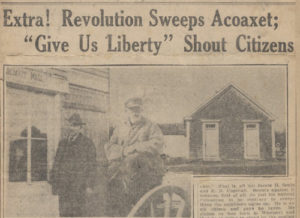 Westport held a special town meeting on March 9, 1926 to tackle the question of Acoaxet’s bid to secede from Westport. Over 300 citizens attended – the largest number ever seen. The focus was on taxes. Added to the dispute over tax fairness was an underlying resentment that had carried over from the World War. It was exemplified in a poem by Bill Potter, which he read at the town meeting. It went, in part:
Westport held a special town meeting on March 9, 1926 to tackle the question of Acoaxet’s bid to secede from Westport. Over 300 citizens attended – the largest number ever seen. The focus was on taxes. Added to the dispute over tax fairness was an underlying resentment that had carried over from the World War. It was exemplified in a poem by Bill Potter, which he read at the town meeting. It went, in part:
The boys received a dollar a day
and many lost their health
The rich man stayed at home engaged
in doubling his wealth
And when our lads at last came home
Prepared to settle down
they found the rich men ready
to take part of their town
Read more here
The Lonely Poet
A poem written by Westport whaling master Edward Davoll to his wife Elizabeth L. Brownell:
THE PARTING
We part now, the tenderest friends,
Thou for the ocean main
I in loneliness to stay,
Oh when to meet again.
My heart is sad for thee,
For lone thy way will be, dear,
And oft they tears shall fall,
For thyself and me.
The music of thy gentle voice,
I’l loose for many a year,
And the merry shout of thy approach,
I’l list in vain to hear.
Yet my spirit clings to thee,
Thy soul remains with me,
And oft we’l hold communion sweet,
O’er the dark and distant sea.
And who can paint our mutual joy,
When all thy wanderings o’er,
We both will join in pleasures name,
At home to part no more.
Then gird thine armour on,
Nor faint thou by the way,
Til God shall roll the day around,
When thou shall with me stay.
Read more here
The Humorous Poet
The identity of poet is a mystery. However, the poem does record some uncomfortable truths of outhouses throughout the seasons.
The Outhouse
We had a place in our backyard with a little quarter-moon vent
Remember that little back-house where everybody went?
There were two big holes in the seat-board and a little one down below
The wasps built their nests up near the ridge over the seats in a row.
A box of old newspapers was there well in reach of the hand.
It looks kind of crude to us moderns but we used to think it grand.
There was a long pale peg in the corner to use when the pile got high.
You could sit and read the papers and occasionally swat a fly.
But when it came to winter there was quite a lot of grief.
That time of year in early morn, you made your visit brief.
The seats were covered with the frost and the wind blew up from under.
How we used to stand it then makes one stop and wonder.
You’d sit down so gingerly and hurry all you could
And dash back fast into the house most anybody would.
Then back yourself up to the stove and shiver now and then
And sort of think how nice twould be when summer came again,
Summer with its odor, flies, wasps and smothering heat
When nature called you could take your time. It was really a treat.
Company for Sunday dinner, you felt anything but gaunt???
Walking around garden paths trying to look nonchalant.
Someone in the (doniker) their foot against the door
If people don’t like company, what are the other seats for?
Romantic Poets
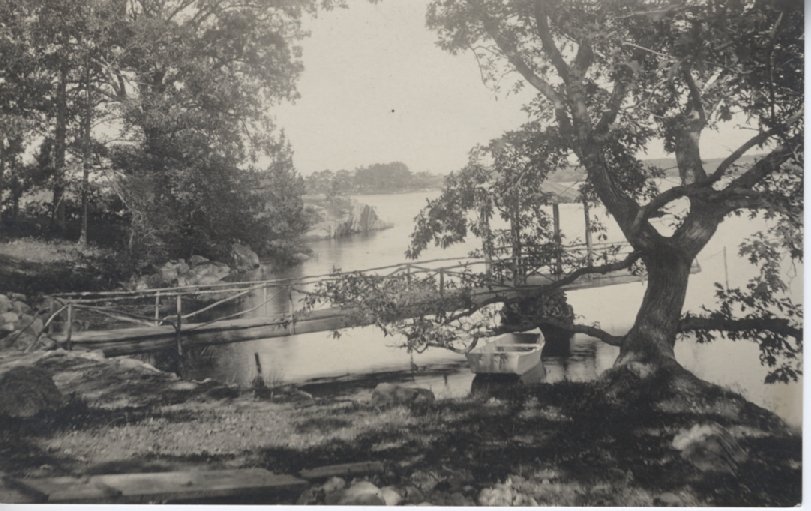 Susan E. Gammons (1845-1911) wrote poetry for many occasions. Her multi-verse poem conjuring up visions of Cadmans Neck is notable for its length and for its idyllic portrayal of the location. This poem was published in a Cadman’s Neck Camp Meeting program booklet.
Susan E. Gammons (1845-1911) wrote poetry for many occasions. Her multi-verse poem conjuring up visions of Cadmans Neck is notable for its length and for its idyllic portrayal of the location. This poem was published in a Cadman’s Neck Camp Meeting program booklet.
Cadmans’s Neck
A green retreat ‘neath the summer sky,
Where the fleecy clouds go sailing by,
While the river bends, like a silver bow,
Round its pleasant shore in its ebb and flow,
Cool oaken shades when the sun is bright,
And a glimpse of fairy land at night,
When the river breeze has fanned the camp,
Alight with many a twinkling lamp.
Then the voice of song on the evening air,
Breaks the solemn silence that follows prayer;
The words are borne to the listening ear,
On the tones of the music sweet and clear,
“A tent or a cottage, why should I care?
They’re building a palace for me over there,”
And heaven seems nearer than clouds that fleck
The moon-lit arch over Cadman’s Neck.
But who was Cadman, and where did he get
The Neck that claims him for owner yet?
Was he the last of the vanished race,
Who hunted and fished in this beautiful place?
Was he the forerunner of those who came
To dispossess them of land and game?
Rose his wigwam rude by the river’s side?
Did his bark canoe o’er its waters glide?
Or, had he a humble cabin, made
Of unhewn logs, in the forest ‘glade?
Did he slay his game with arrow and bow,
Or shoot with a musket; did anyone know?
The indian once through this forest strayed;
While his dusky squaw by the wigwam stayed,
And their small pappoose in the sunshine at play,
Was as free as the squirrels and nimble as they.
He brushed the dew from the sedge away,
With his moccassined feet at the dawn of day,
Down the Noquochoke paddled his light canoe,
(His labors were slight, for his wants were few,)
Cooked his fish and clams by the river bank,
From the clear cool springs when athirst he drank;
And returning, sometimes, when the day was done,
And low o’er the hills hung the westering sun,
Saw mirrored in waters all peaceful and still,
The beaches, the bluffs, and the green wooded hill
Of Cadman’s Neck, warm with the roseate glow,
And scarce knew if the real were above or below.
* * * * * * * *
Our search has been long, but our labors are past,
Right here on the spot we have found him at last.
He built him no cabin in forest or glade,
But out on the hill-top his dwelling he made;
He lived there and died there and gave it a name,
And for long generations his kindred the same;
Save that down on the hillside, remains of a well,
The tale of a homestead, forsaken, may tell.
But if spirits revisit, as some think they may,
The scenes they frequented in life’s busy day,
And if Cadman should wander some night through the camp,
When the mist from the river hung heavy and damp,
Would he wander what manner of people were these
Who builded their cabins in shadow of trees?
And if ‘gainst an oak trunk bicycle lean,
Would he deem it a new-fangled spinning machine?
Would he think the white tents standing spectral and cold,
Were the ghosts of the wigwams he knew there of old?
But some things e’en Cadman would find were unchanged
Since, in strength of his manhood the wildwood he ranged.
The sky is as blue and the air is as free,
And we find the cool shadows as grateful as he,
O watchman, shouldst meet him at night on the ground,
Pray greet him politely and show him around.
And if, why this gathring he charge thee to tell,
O answer him wisely and answer him well;
“For what do we come here?” For just what we will;
We are ever pursuing our good or our ill;
Some seek here for pleasure, and some seek for rest,
And whatever is sought for, rewarded the quest;
For in this peaceful shade, beneath heaven’s blue vault,
It is said some have even been known to find fault;
And a hallowed spot is this campground sod
To seeking souls who have here found God.
Ah! Cadman, we deem thee than many more blest,
In that, though uncertain the place of thy rest
Thou art held in remembrance and doubtless shall be,
As long as the river flows by to the sea,
For each season when verdure the oak tree shall deck,
Many hearts will be turning to fair Cadman’s Neck;
While of those here who gathered, the brilliant and young,
The preachers who reached, and the singers who sung,
After two hundred summers so fleeting is fame
There’ll be few to remember they’d even a name.
The Nostalgic Poet
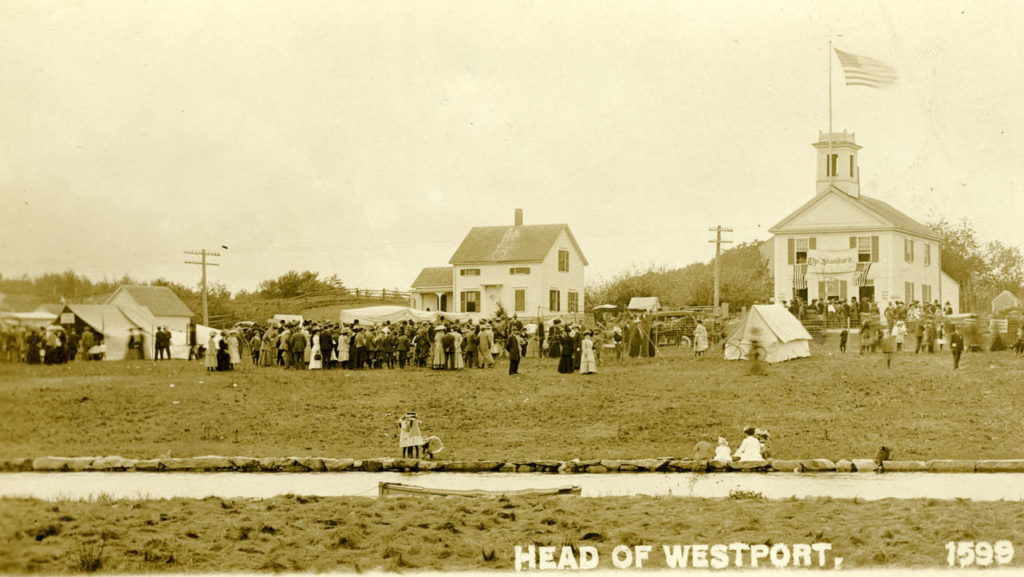 According to Dr. Burt, organizer of the celebratory gathering Old Home Week at the Head in 1908, “one of the requisites of a successful Old Home Week was a poem written by some old resident.” This poem was written by Elizabeth Burrill in her 80th year. She was the daughter of Dr. Richmond, at one time a doctor living at the Head of Westport.
According to Dr. Burt, organizer of the celebratory gathering Old Home Week at the Head in 1908, “one of the requisites of a successful Old Home Week was a poem written by some old resident.” This poem was written by Elizabeth Burrill in her 80th year. She was the daughter of Dr. Richmond, at one time a doctor living at the Head of Westport.
Old Home Week 1908
Ah! Dear old Westport with its hills and dales
And bonny river gently gliding through,
To Homeward breezes now we trim our sails
And on Life’s ocean wander back to you.
We have journeyed far, varied has been our lot.
Like others we have had our smiles and tears;
And yet Old Westport we have not forgot,
Amid the toils and cares of passing years.
I was born here, near four score years ago,
Yet memory serves me well of olden days.
Ah! Times have changed, how much you scarcely know
Who dwelt not here when we had other ways.
The home song of the whirring spinning wheel,
The busy shuttle with its noisy clack,
As house wives wove-Even yet I seem to feel
The roughness of that cloth upon my back.
In those far times each one her stockings knit.
Made her own clothes, required no foreign aid,
And though there sure was many a misfit,
We wore them proudly and were unafraid.
Those winter nights, when high the logs were piled,
Shut in by snow drifts from the outer world,
When we retired with warming pan, and smiled,
As in warm blankets we were snugly curled.
Then springtime in the country when the air
with scent of lilac and of pink was sweet,
When nature woke to life, and free from care.
We wandered where we would with dancing feet.
Temple of learning, where I sat in youth,
Conning the books that now are out of date,
And working sums (that tired my brain, in truth)
Upon a heavy, framed, old-fashioned slate.
That school house had a bell with hanging rope
That swept a length upon the sanded floor,
And ringing it at times gave ample scope
To boyish muscles and to fun galore.
A rusty stove stood in the middle aisle,
In winter glowing with an intense heat.
And we were glad to stand around it while
We warmed numb hands and thawed our frozen feet.
And yet in spite of all, we were not fools,
The knowledge that we gained was of the best.
It would compare with man y mod ern schools,
If good, sound scholarship should be the test.
Then the old church where Sabbath days we sat
On hard pine seats (’twas guiltless of a pew)
And listened to long sermons dry and flat.
To keep awake was all that we could do.
Until the old time choir struck up a hymn,
Which, truth to tell, they sang quite out of tune.
What lacked in music they made up in vim,
Which brought us back from dream land very soon.
To what base uses has the old church come.
Within its walls hens cackle, roosters crow,
The voice of preacher and of choir is dumb,
Lost and forgotten in the long ago.
The stone house now in picturesque decay,
I can the story of its building tell.
The granite brought from quarries not far away,
To form the walls where a king might dwell.
(Or so we thought.)
Some of our neighbors in those days were quaint,
Not rich in goods but most with hearts of gold
But now they nearly all, sinner and saint,
Are dust and ashes ‘neath the churchyard mould.
Still here is Westport with its hills and dales,
And bonny river gently gliding through,
So in this Harbor we will furl our sails.
And in old “Home Week” scenes of yore review.
The Accusatory Poet
“Westport is full of trouble
It’s people filled with grief
In rhyme I am seeking solace
As temporary relief”
This poet went to some trouble to write and publish “Westport Jingle.”
Unfortunately, the events described in the poem are somewhat obscure. The accusatory tone of the poet is overwhelming.
Resources:
Baker, Mercy, Etta. White Elephant Sale. The Torch Press.
Baker, Mercy Etta. Bird Logic and Other Verse. Privately printed 1955.
Hall, Lucy Duncan. Artists in Living Ann and Vibe Spicer. Ralph Fletcher Seymour, 1941.
Sheehan, Fiona A. ‘Affectionately Yours, Bishop’: The Early Correspondence of Elizabeth Bishop and Rhoda Wheeler Sheehan. Resources for American Literary Study, Penn State University Press. 2018; 40: 229-280.
Yeomans, Edward Jr. Nourishing the Spirit. Windflower Press, 1991.
Yeomans, Edward. Occasional Notes 1923-1933.
Westport History Study Group, Alan Powers: 3 well-known poets associated with Westport (Elizabeth Bishop, Carol Knox and Joannie Mikowski), https://vimeo.com/523475060

